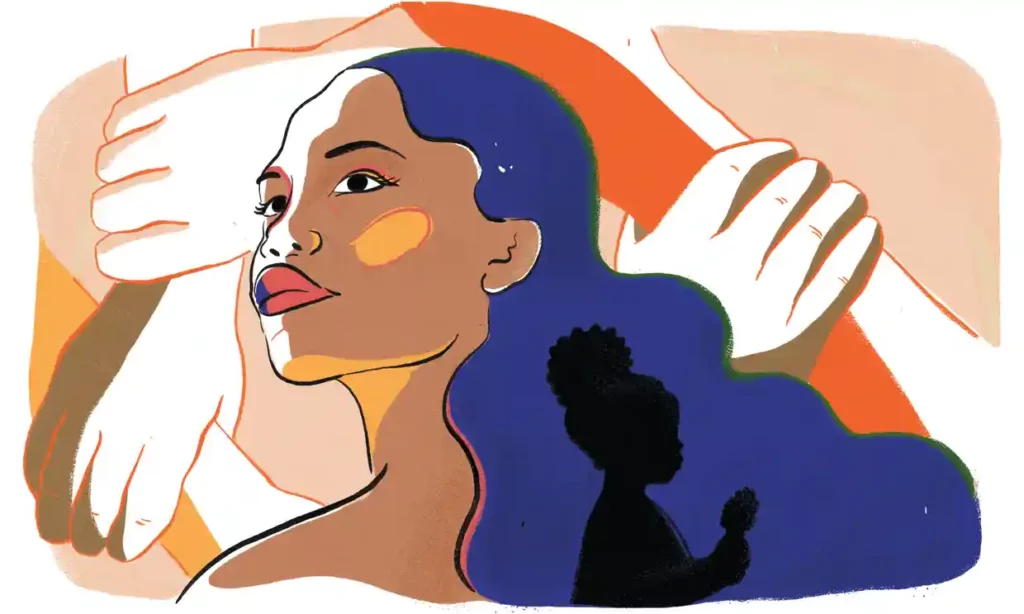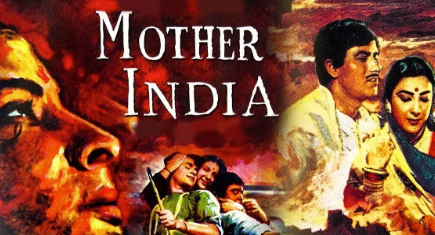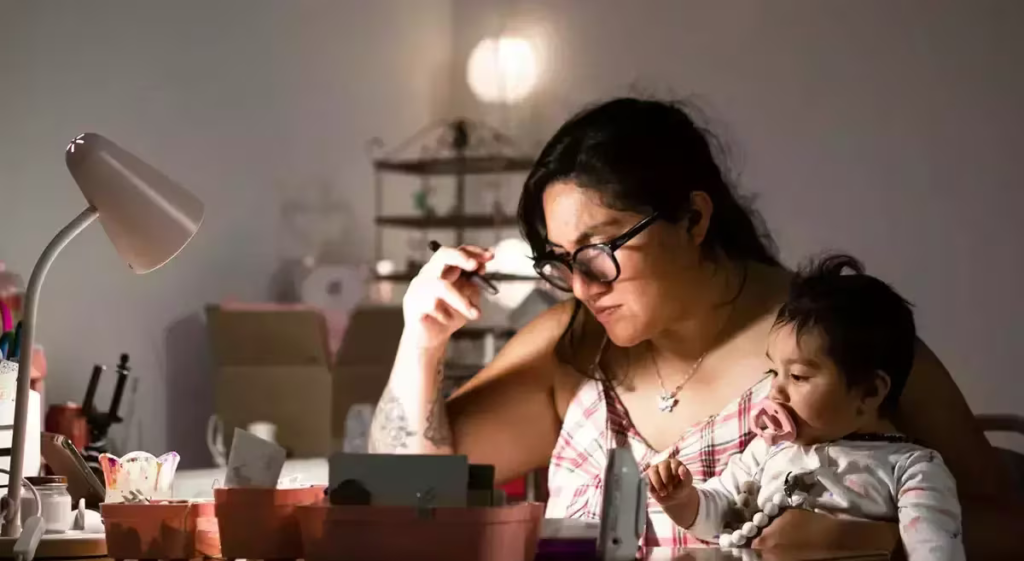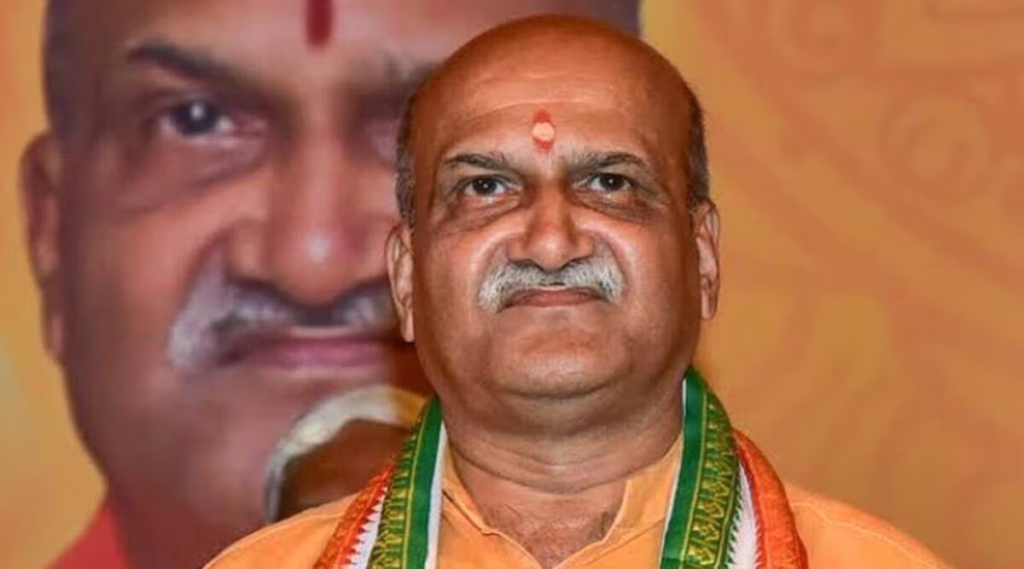
Picture credits: @yolandayoungesq/ The Guardian
Early in February, Sidra Aziz tweeted: “I am 31 years old and over the last few years I have very consciously chosen not to have children ever. Marriage, maybe. Children, no.”
It was an innocuous enough tweet but the 31-year-old data product manager was taken aback by the response. Within hours, it had generated 42,330 impressions and over 500 replies.
The kinder ones advised her to have “one kid at least” for “positive energy”. Others called her a child-hater and still others warned that she would die alone with nobody to bury her.
“Nearly all the men were telling me how I was the worst human being and a bad Muslim woman for not wanting kids,” Aziz told me on the phone. “The women were nearly all empathetic and said it was my decision.”
Women like Aziz who decide to not have children should not have to be shamed for it. But they are.
Despite the abuse, Aziz said she’s happy her tweet has opened up a conversation not often heard in South Asia where most women follow the cyclical rinse-repeat pattern of their mothers’ lives: Study, work, get married, have kids.

Mere paas maa hai

The role of women as mothers from religious literature to popular culture is so ubiquitous that it makes you wonder if women actually have an authentic choice in the matter, said Amrita Nandy, author, Motherhood and Choice: Uncommon Mothers, Childless Women. “We are a pro-natalist culture where, as South Asians, we imagine children as the emotional pivot of our lives.”
In such an environment, choosing to be child-free is seen as subversive. “It’s beyond radical. To choose to be child-free is almost seen as evil,” Nandy said. It challenges the very roots of the social fabric where girls are raised to marry and become mothers, she said.
The choice to be child-free seems limited to women of privilege. They tend to be highly educated professionals with a relatively strong degree of autonomy.
Right from the time when she was in college, Aishwarya Iyer now 27, knew she didn’t want to have children. “I can barely take care of myself, I don’t want to have to take care of another human being,” she said, clarifying that she loves children, just doesn’t want her own.
Her partner of eight years was at first surprised to learn of her decision but now has come around to her point of view. “For him it’s a question of finances, having to spend our lives saving for children, for their education and care.”
While both sets of parents are aware of the couple’s decision, her mother still hopes she will change her mind. “What is the purpose of your life without children?” she asks. Her partner’s mother too has questions: “Who will take care of you when you are old?”
Iyer said both are in “a state of disbelief. They think it’s just a phase – one that I will outgrow.”
M – who didn’t want her name to be used — has been married for seven years with no children and no plans to have any. “I love kids,” she said. “In my extended family, I am everyone’s favourite baby-sitter.”
But her own children? Not for her. She’s thought it through. 1. Her husband’s job has crazy hours that would leave her as “virtually a single parent”. 2. “Looking at the world and especially our country, it just wouldn’t be responsible for me to have a child.” And, 3. There is no state economic support for children and “we’d be slogging our a**es off to bring up and educate a child.”
The lack of support extends to family as well, said M. Yes, the grand-mothers would pitch in but then they would also have their own ideas about how to bring up a child.
And finally, there’s this: “Women tend to lose themselves once they become mothers,” she said. “Both my husband and I value our freedom of movement and choice and we don’t want to lose that.”
The motherhood penalty
A post-pandemic 2021 Pew Survey in the US found that 44% of people in the age group 18-49 said they were not at all likely to have children – an increase of 7 percentage points since 2018. The reasons varied from “I just don’t want one”, to financial pressure and cost of living, the state of the world, and climate change

Source: Economic Times
Another somewhat alarmist study predicted that Koreans will become extinct by 2750 if its low birth rates don’t improve. South Korea has the world’s lowest fertility rate at 0.78 in 2022, down from 0.81 a year ago. The government has been pumping billions of dollars into schemes including childcare subsidies but has failed to reverse the decline.
In the UK, the gender pay gap of 15% widens “dramatically” after women have children, new analysis shows.
With a population of 1.3 billion people, 67.51% of whom are in the age group of 15 and 64, fertility rates in India are not a concern – yet. But by 2050, the United Nations estimates that Indians over 60 will double to constitute almost 19.6% of the population.
Across the world, mothers are the primary caregivers of their children, but in south Asia, motherhood has been elevated to near divine status and mothers are expected to put their children’s needs above their own. A woman who prioritises career over family (+ children) is nearly inevitably going to be judged – as Sidra Aziz was.
But motherhood comes at a cost. Labour force participation at 16.1% for women in India who have even one child younger than six is significantly lower than 23.6% by women who have no children, finds a 2017 World Bank paper by Maitreyi Bordia Das and Ieva Zumbyte.
“When do you decide what is a good time to take a career pause?” asked Kanksshi Agarwal, the 30-year-old founder of Netri Foundation, an NGO that aims to increase the number of women in politics. “When you look at the economy, most marriages need two incomes.”
But most women, she said, don’t get a chance to think it through. “Women are expected to go ahead and have children without realising what they’re signing up for. So you first have one child, then you have a second child as a sibling for the one you already have. And if both happen to be girls, you might be pressured into having a third child, so that you have a son. It’s never ending.”
For S, a single lawyer in her twenties who didn’t want to be named, care work is never shared equally, even with past relationships with “progressive” men. She’s chosen to be childfree because “I know the extra work, emotion and physical, will fall on me.”
Moreover, she said, a growing awareness of climate change has only confirmed her decision to not have children. “I don’t see the point in adding one more child to the impending doom.”
So, what if she finds herself in a relationship where the man absolutely wants a child? “It would be a deal breaker. Not having a child is absolutely non-negotiable for me.”

In numbers
84% of women still need the permission of a family member, usually a man, before taking up paid work. But once in jobs, 78% said they would stick it out even if they didn’t have a financial need for it.
Source: Women and Work: How women fared in 2022 report by IWWAGE and Lead at Krea
Watch
The Seattle city council voted to add caste as a category protected by its anti-discrimination laws, thanks to legislation drawn up by Kshama Sawant, the only Indian-American on the council.
Caste-based discrimination is now banned in businesses, in places of public accommodation and transportation, in restrooms and in shops.
I found this short video clip courtesy Obed Manwatkar of this historic moment with supporters shouting Jai Jai Jai Jai Bhim incredibly moving.
Read Naomi Ishisaka on how India’s caste system manifests in Seattle-area workplaces and beyond. In The Seattle Times here.
Seen and heard

“If we lose one Hindu girl, we should trap 10 Muslim girls. If you do so, the Sri Ram Sena will take responsibility for you and provide every kind of security and employment.”
Sri Ram Sene boss Pramod Muthalik proudly displays his views on “girls” as cannon fodder in his war against India’s citizens. It should worry us that he plans to run as an independent candidate in Udupi’s Karkala constituency in the upcoming Karnataka elections.
News you may have missed
SC won’t hear period leave PIL
Saying it was a “policy decision”, the Supreme Court refused to entertain a public interest litigation that sought paid menstrual for students and employed women. The court advised the petitioners to approach the women and child development ministry with their request.
Roughly 20% of menstruators (women, trans men and non-binary persons) have PCOS. Some 25 million suffer from endometriosis, leading to heavy or painful periods.
India’s violent spree of killing partners now, sadly, includes women too
In July last year Bandana Kalita, a 32-year-old gym instructor, killed her mother-in-law, 62-year-old Shankari Dey. Less than a month later, she killed her husband, Amarjyoti Dey. Then with the help of two male friends, she chopped up the bodies and made two trips to Meghalaya to dispose the bodies.
Bandana and the two men, a taxi driver and a vegetable vendor, have been arrested in Assam’s Guwahati.
A judge by any other name
How do you address a woman judge? Gujarat high court chief justice Sonia Gokani, the sole woman chief justice right now, took exception to being called “your ladyship”. Sir, she said, would do just fine.
Women remain woefully under-represented in the higher judiciary. In 2022, of the 165 judges appointed to various high courts, only 34 were women. Since 2018, just 84 of the 554 judges appointed have been women.
…And the good news

The Indian Army has begun assigning women officers to command roles for the first time, outside of the medical stream. Around 50 women officers are set to head units in operational areas, including forward locations in the critical northern and eastern commands.
Read more here.
The long(ish) read
Text, sext, extort: A cautionary tale
Bombay Boy had registered on a leading matrimonial website when he got a WhatsApp message from a woman. After a few text exchanges she suggested they take it forward on video. He agreed.
When he accepted the call, he saw a woman in the nude touching herself. He hung up. Then began the nightmare. What he received next was a screenshot of the video call and a clip of the woman with Bombay Boy’s face superimposed on it. The next day he received a call from a “police inspector”.
Shiv Sunny, Shrinivas Deshpande, Gautam S Mengle and Vijay Kumar Yadav take a deep dive into an extortion racket that involves entire villages in Rajasthan.
Read more here.
AROUND THE WORLD
In Japan, the developed world’s youngest age of consent at 13 set in 1907, is set to go up to 16 as part of a long overdue overhaul of sex crime laws. Parliament is yet to ratify the changes, reports Vice, that will include criminalising the grooming of minors and expanding the definition of rape to include acts committed using drugs and intoxication.

Shamima Begum’s lawyers give a statement outside Field House. (Source: Vuk Valcic/Zuma/Rex/Shutterstock)
In the UK, Shamima Begum who at 15 had travelled to Syria to join the Islamic State group, has lost an appeal to have her British citizenship restored, reports The Guardian. Although there was “credible suspicion” that Begum had been trafficked to Syria for sexual exploitation and there were “breaches of duty” by UK authorities in allowing her to make that journey, Begum now 23, will still lose her citizenship, nor will she be allowed the right to argue this decision in person.
Read Conor Gearty’s Guardian opinion piece here.
In South Korea, city officials in Seoul are removing women-only parking spots 14 years after they were introduced to protect women , reports BBC. Critics say the move is the latest in a string of anti-feminist policies including, for instance, removing the term “gender equality” from its school ethics curriculum and trying to shut down its gender equality ministry.
In Tennessee, USA, lawmakers are debating on whether to restrict drag performances in public or in front of children, reports Reuters. The bill is amongst a dozen advanced by Republican politicians that seeks to limit drag, which uses costumes and makeup to play with gender norms.

| Were you forwarded this email? Did you stumble upon it online? Sign up here. |
| That’s it for this week. Do you have a tip or information on gender-related developments that you’d like to share? Write to me at: namita.bhandare@gmail.com. Produced by Sukoon Wadhawan sukoon.wadhawan@partner.htdigital.in. |